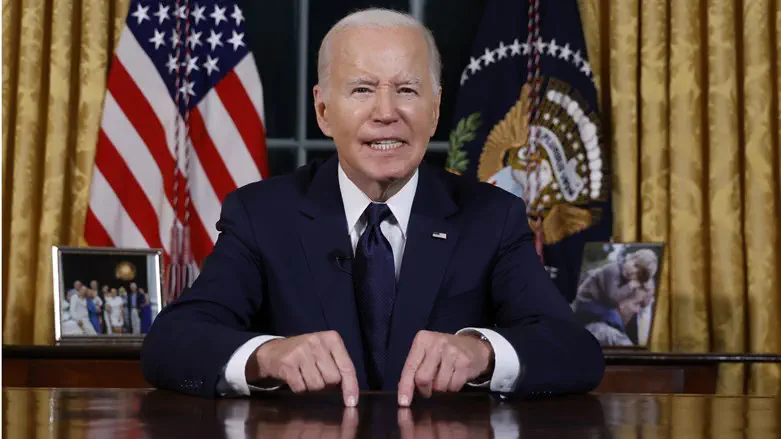
The night of Saturday, April 13, was historic. It was the first time in Iran’s decades-long campaign to destroy the State of Israel that the Islamic Republic directly attacked the Jewish State. In an unprecedented assault, Iran launched 170 explosive UAVs, 30 cruise missiles, and 120 ballistic missiles at Israel.
Israel’s defense was just as historic. Nearly all of the projectiles were intercepted and destroyed. Only a handful of missiles struck their targets, damaging an Air Force base and critically wounding a seven-year-old girl. According to the IDF, the interception rate was 99%. Never before had a country’s aerial defense systems been tested in such a manner, and such a near-perfect success rate in stopping 300 highly dangerous missiles and drones is nothing short of miraculous.
With the attack dealt with, the question now is, what comes next? How should Israel respond this act of war against its civilian population?
Much of the world, fearful of a wider war with Iran, wants Israel to refrain from retaliating against Iran. The militaries of the US, UK, France, and Jordan shot down many of the drones and missiles before they reached Israeli airspace, ensuring that Israel’s own air force and its David’s Sling an Arrow systems would not be overwhelmed. In return, the West, led by the US, now wants Israel to “take the victory” and act like Saturday night’s attack never happened.
Iran cannot be allowed to get away with such a reckless and massive attack on another nation. That much is clear. But it may be America’s actions that are more important in ensuring the Iranian regime pays the price and can no longer commit such attacks in the future, rather than Israel’s.
The US government’s policies toward Iran over the last two Democratic administrations have caused enormous harm and made an all-out war in the Middle East far more likely. These policies must be reversed immediately if a war is to be avoided or at least mitigated.
The Obama Administration had an inexplicable (or so it seemed) fixation of empowering Iran at the expense of all American allies in the region, embarking on a policy of hope that if America was nice to Iran, the mullahs would start behaving like responsible statemen. During the Obama years, the US ignored its allies’ justified fears as well as the Iranian government’s openly declared intentions of regional conquest and the destruction of not just Israel but America itself.
By Barack Obama’s second term, a nuclear deal with Iran became the centerpiece of his foreign policy goals. The pursuit of this deal led him to abandon his red lines against Syrian dictator Bashar al-Assad’s use of chemical weapons against his own people, effectively abandoning the civilians of Syria to be slaughtered in the process.
The deal Obama finally did sign in 2015 was terrible for America, terrible for Israel, terrible for the Middle East, terrible for the world, and terrible for the people of Iran. The only people it was not terrible for were Obama, his staff, and the Ayatollahs.
This deal freed over a hundred billion dollars for Iran’s government to use as it saw fit in exchange for temporary cutbacks in its nuclear program. This money, as anyone but Obama’s people knew it would, was used not for the people of Iran, but to spread terrorism and death across the Middle East and the world. Meanwhile, the restrictions on Iran’s nuclear program would have expiration dates due to the included sunset clauses.
The agreement that was supposed to keep Iran from building nuclear bombs was so flawed Iran could build nuclear bombs without violating it, as long as it waited what is a short time in the eyes of the leaders of a theocratic dictatorship. Appeasement did not work in the 2010s any better than it did in Munich in 1938.
Iran did not moderate its positions an iota after the deal was signed. It did not stop funding terrorist proxies such as Hamas and Hezbollah. It did not stop calling for the destruction of Israel or the US. Instead, it celebrated the idiocy of the American government, which appeased its enemies in the foolish notion that if it just gave Iran enough, Iran would become a friend.
The following administration’s approach to Iran was more sensible. While withdrawing from the nuclear deal was risky, Donald Trump’s maximum pressure campaign against Iran was correct. When he left office, Iran’s economy was in shambles, and its ability to engage in malignant activity was greatly reduced as a result.
Unfortunately, this approach was abandoned by the current Biden Administration, which, while not beholden to the delusional fantasies of the good an empowered Iran could do the Obama Administration clung to, still returned to the policy of appeasement.
Biden wasted years attempting to revive the dead nuclear deal, only to be spurned by Iran at every opportunity. He lifted sanctions and rescued the Iranian economy, allowing Iran to continue funding Hamas, Hezbollah, the Houthis, and more, while rushing towards nuclear breakout. He allowed Iran access to billions of dollars while Iran grew closer to Russia, supplying Putin’s war machine with weapons used against Ukraine.
Last year, the Biden and Obama Administration’s envoy to Iran, Robert Malley, was removed from his position after his security clearance was suspended amid an investigation into his handling of classified material. The FBI has been involved in the investigation. Even Malley, who is as pro-Iran as it was possible to be, could not entice his partners into a new deal when they could do so much without one.
Meanwhile, Iran continues to enrich uranium far beyond what is required for any non-military use and could have enough weapons-grade material for multiple bombs in months, giving Iran the power to carry out the threats it has been making for the last 45 years. If nothing is done, the nightmare scenario of a nuclear Iran will grow ever more real until it is a fait accompli.
The stronger Iran becomes, economically and militarily, the stronger its terrorist proxies will become, the greater the global terrorist threat will become, and the greater the odds of a full-scale war in the Middle East will become, even without the nuclear threat.
To prevent a repeat of Saturday night’s attack, to prevent a cycle of violence in which Iran and Israel and the entire Middle East are drawn into a war, the Biden Administration must change course immediately. It must impose crippling sanctions that make any military venture far too costly for Iran to contemplate and force it to choose between continuing to fund Hamas, Hezbollah, and the Houthis, or functioning as a government in its own country.
The long-term policy of not just the US, but the entire free world, must be regime change in Iran. As long as the Ayatollah’s regime continues to exist, Iran will continue to be a threat to world security, not only the security of Israel. Until Iran is freed from the control of the Mullahs, Lebanon, Yemen, and Iraq will continue to be destroyed by Iran’s proxies. Hopefully, this can be accomplished without war, by supporting the people of Iran whenever they rise up against their autocratic rulers, as they have multiple times over the last 15 years, and as Obama refused to do when they turned to him.
A war against Iran may be inevitable no matter what the US or anyone does. Iran crossed a Rubicon by launching 300 missiles and drones at Israel. If the US continues on the path of the last three years and does nothing but restrain Israel, a war is definitely inevitable. Such a war would see Iran and its proxies at the height of their powers, resulting in the worst destruction. The only variable would be if this war occurred before or after Iran built nuclear weapons. The few missiles that got through the defenses Saturday night and struck southern Israel were ballistic missiles. If any of those missiles had carried a nuclear warhead, what would have happened is too horrible to even contemplate.
A weaker Iran, crippled by sanctions, would be far less likely to repeat Saturday night’s attack and far less likely to be willing to start a war. But if it does, this war would be less deadly and destructive than a war with an empowered Iran would be.
To do nothing, to let Iran get away with its attack and to continue to build its war machine, while building nuclear weapons, is the worst possible option. Because if next time, Iran launches missiles equipped with nuclear warheads, even an interception rate of 99% is nowhere near good enough.
Gary Willig is on the Arutz Sheva news staff.
